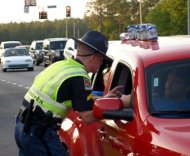Article from: www.thenewspaper.com/news/38/3835.asp
7/5/2012
Alabama: Appellate Court Scales Back Roadblocks
Second highest court in Alabama strikes down drunk driving roadblock for failure to have
 Roadblocks are illegal if police conducting them fail to operate under strict guidelines that the Alabama Court of Criminal Appeals strongly suggested Friday ought to be written down. In a split, 3-2 decision, the court considered the July 2, 2011 roadblock set up by Alabama state troopers in rural Elmore County on the weekend of the July 4 holiday.
Roadblocks are illegal if police conducting them fail to operate under strict guidelines that the Alabama Court of Criminal Appeals strongly suggested Friday ought to be written down. In a split, 3-2 decision, the court considered the July 2, 2011 roadblock set up by Alabama state troopers in rural Elmore County on the weekend of the July 4 holiday.
At the checkpoint, Trooper Eric Salvador stopped the truck driven by Charles Edward Ogburn Jr. As Salvador scanned the interior of the truck, he noticed unopened containers of beer. Ogburn did admit to having "a couple" drinks, so Salvador ordered him to pull off the road for sobriety testing. Ogburn failed, blew a .14 on the breathalyzer and was ultimately convicted of driving under the influence of alcohol (DUI).
The appellate court conducted an inquiry into whether this checkpoint had been operated in a legal manner. Corporal Jesse Thornton had been in charge and chose the Friendship Road at Cherokee Trail location because he thought it would yield DUI arrests and generate tickets for failure to produce a driver's license or proof of insurance. Salvador testified that he believed he had the discretion to wave through important people, such as judges, so they would not be hassled by the stop. Salvador added he always stopped everyone regardless of who they were.
The 1979 US Supreme Court decision Brown v. Texas set the principle that if police seize someone, they must do so according to a set of "neutral limitations on the conduct of individual officers" to prevent Fourth Amendment violations. Ogburn argued there were no specific limitations on the Alabama troopers' conduct at the roadblock, despite the claim that "policies" were in place.
"Although we hold today that a written plan is not required by the Fourth Amendment, we strongly suggest that having a previously established plan that is in writing before the execution of the checkpoint is the best practice," Judge Liles Burke wrote for the majority. "If no previously established written plan is submitted into evidence, a witness for the state must specifically articulate the full details of the previously established plan that limits the discretion of the individual officers at the checkpoint in accordance with Brown v. Texas."
The case at hand lacked both written guidelines, and Trooper Salvador's testimony that he had discretion to let a judge go free proved fatal to the prosecution's attempt to claim that limitations were in place.
"In the present case, the state did not present any evidence of the limits on the field officers' discretion," Burke wrote. "Therefore, the warrantless stop of Ogburn at the checkpoint without any individualized suspicion of wrongdoing was unreasonable; thus, the evidence obtained pursuant to that stop should have been suppressed. Without that evidence, there is no evidence to support Ogburn's conviction for DUI."
A copy of the decision is available in a 1.5mb PDF file at the source link below.
Source: Ogburn v. Alabama (Alabama Court of Criminal Appeals, 6/29/2012)
Permanent Link for this item
Return to Front Page
 Roadblocks are illegal if police conducting them fail to operate under strict guidelines that the Alabama Court of Criminal Appeals strongly suggested Friday ought to be written down. In a split, 3-2 decision, the court considered the July 2, 2011 roadblock set up by Alabama state troopers in rural Elmore County on the weekend of the July 4 holiday.
Roadblocks are illegal if police conducting them fail to operate under strict guidelines that the Alabama Court of Criminal Appeals strongly suggested Friday ought to be written down. In a split, 3-2 decision, the court considered the July 2, 2011 roadblock set up by Alabama state troopers in rural Elmore County on the weekend of the July 4 holiday.